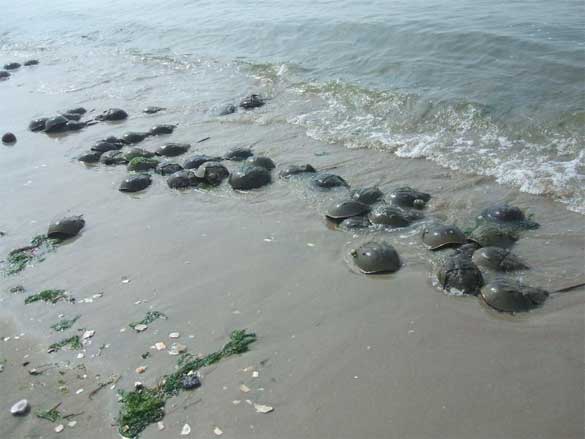Diminishing Manpower And Confusing Regulations Lead To Increase In Illegal Horseshoe Crab Poaching

Illegal poachers are flaunting fishing laws and regulations at increasing rates as the manpower to police the laws have been slashed. The New York Times is reporting that overlapping state and federal regulations have also caused many cases against poachers to be dismissed at court as well.
Last Memorial Day, we reported on a late night NYPD helicopter chase that targeted poachers illegally harvesting horseshoe crabs off in Jamaica Bay. The crabs are prized by the pharmaceutical industry for a component in their blood, but most poaching occurs by commercial fisherman who use the crabs as bait and by some ethnic groups that eat them. The Times also indicated that laws designed to protect the horseshoe crab population are creating as many problems as they solve:
Moratoriums on horseshoe crab fishing in New Jersey have driven up their price, from about one dollar per crab five years ago to about five today. The very rules meant to protect the crabs, some fishermen say, have made them a more desirable catch.
Another problem endangering the horseshoe crabs are cuts brought about by the federal sequestration in Washington DC. The cuts to the US Park Police, who patrol the bay, have made it easier for illegal poachers to flourish.
“We’re not catching 50 percent of the people,” Captain Francisco Lopez told the Times. “We just don’t have the manpower.”
The lack of manpower has led to a huge increase in the illegal poaching world not just in horseshoe crabs, but with other protected fish species. A Sheepshead Bay fisherman who wished to remain anonymous told the Times that a nefarious element has become more common:
“It’s a whole underground world,” said a fisherman standing outside Stella Maris Bait and Tackle in Sheepshead Bay one day recently. He declined to give his name for fear of retribution from his peers. “You go to any market, and there’s people selling fish, anytime, that’s illegal.”
“Ever see those mob movies?” he added, as whelk, also called scungilli, were unloaded nearby. “People come out of the woodwork that you’ve never seen, envelopes full of stuff, this, that, money.”
With less federal and state authorities policing the waters, the hopes of catching poachers increasingly falls on the shoulders of concerned citizens and law abiding fishermen, who also have much to lose if suspected of cooperating with police. The Times explained the ordeal facing John McMurray, a local conservationist who dared rat on poachers:
After he reported a man he suspected of poaching to state enforcement officers, John McMurray said that his charter boat, One More Cast, was vandalized and untied from its moorings in Somerville Basin on the Rockaway Peninsula; it ended up on the rocks.
Shortly after, Mr. McMurray, a conservationist who sits on the Atlantic States Marine Fisheries Commission’s striped bass advisory panel, said he arrived to find One More Cast at the bottom of the marina. Though he does not have proof, Mr. McMurray suspects that what befell his boat was retribution. “It certainly made me think twice about ratting out a guy at my marina again.”
Other obstacles facing law enforcement are speedier boats that allow poachers to simply outrun the police; when spotted they drop their weighted burlap bags, sinking any evidence if they are caught. Cases against illegal poachers are also notoriously difficult to prosecute due to technicalities concerning the definition of fish and the overlapping state and federal rules which lead to dismissals.
Despite the increased levels of poaching and relative difficulty in prosecuting those who are caught, many fishermen lament the laws that they say are driving them out of business for good. John Arena, a fisherman once arrested with 46 striped bass, declared that the Jamaica Bay fisherman was an “endangered species.”




